5 Proven Strategies to Dominate IELTS Listening Short Answer Questions
Are you struggling to capture precise details in the IELTS Listening test? You are not alone. Among the various question types, Short Answer Questions stand out as a unique challenge that tests not only your listening comprehension but also your grammatical accuracy and ability to synthesize information under pressure. Many candidates lose valuable marks here simply due to word count violations or minor syntax errors. In this comprehensive guide, IELTS-Testpro provides a deep dive into the mechanics of this question type, equipping you with expert strategies and grammatical insights to turn this potential weakness into a definitive strength.
I. Introduction to IELTS Listening Short Answer Questions
At IELTS-Testpro, we understand that precision is key to achieving a high band score. One of the most common yet tricky formats you will encounter is the IELTS Listening Short Answer Question. While these questions can appear in any section of the Listening test, they frequently populate Section 2, where a monologue is delivered in a general social context.
Essentially, this task requires test-takers to respond to interrogative prompts such as What, When, Where, Why, or Which. Unlike standard open-ended questions, the challenge here lies in brevity and accuracy. You are strictly bound by a word limit instruction, typically phrased as: “WRITE NO MORE THAN THREE WORDS AND/OR A NUMBER.”
A list of questions will follow the sequence of the recording. Your objective is twofold: listen for specific factual information and transcribe it exactly as heard, ensuring it fits grammatically within the answer box.
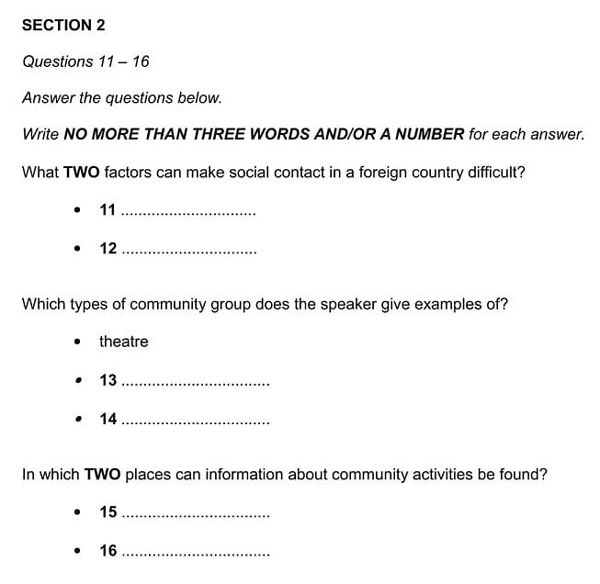
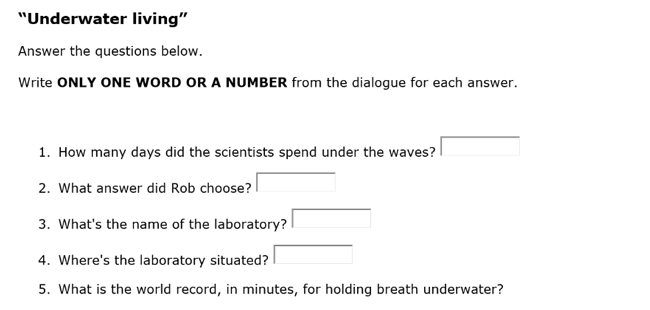
After getting to know IELTS Listening Short Answer Questions, you need to find out your appropriate learning strategies and several useful tips to dominate this question type.
II. IELTS Listening Short Answer Questions Strategies
Before diving into strategies, it is crucial to understand what this question type actually tests. It is not just about hearing; it is about syntactic precision.
1. Read the instructions carefully
Before listening for the prompts, take your time to look at the requirements before questions to identify the word limit for each answer. Underline or highlight this to make sure that you will not go beyond the word limit.

2. Read the questions and Identify keywords
It’s now time to read all the questions and spot all keywords necessary for locating the information whilst listening. Underlining or highlighting those keywords is highly recommended so that you can both save time and have more chances to get a high score. Focus more on questions words (What, Where, When, Which, etc.) and unchangeable words (names, dates, places, etc.)
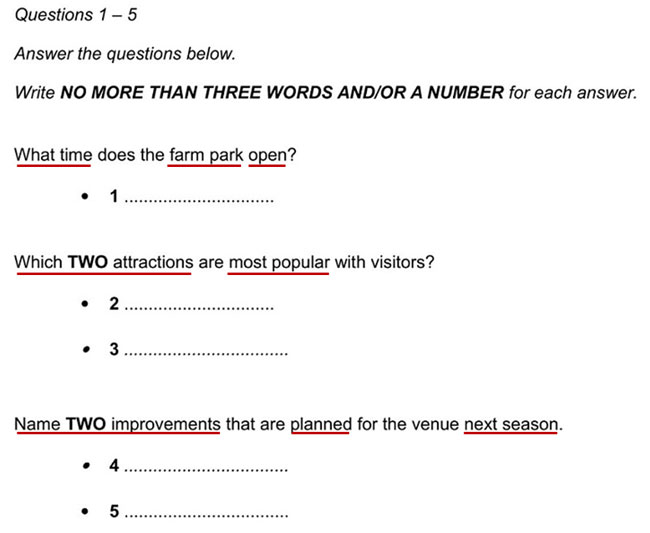
For changeable words, you should think of synonyms or paraphrases that can be used in the recording.
3. Predict the answers
For IELTS Listening Short Answer Questions, predicting the answers seems to be more difficult than other types of questions. Nevertheless, try to think about all possibilities for each question during your preparation time.
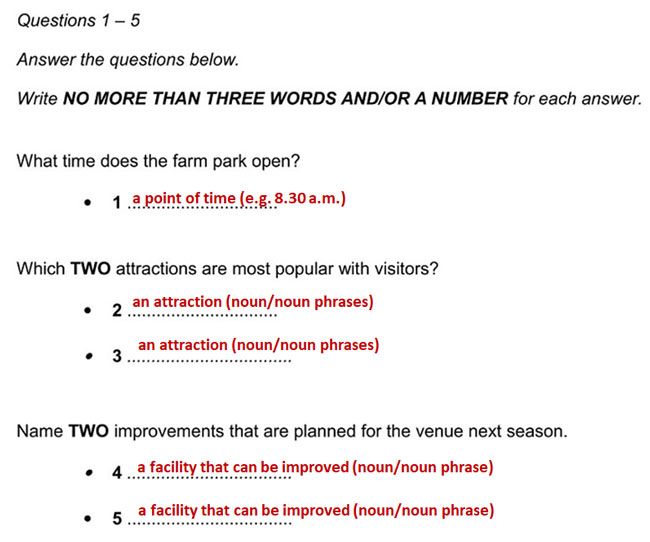
For example, in the picture above, we can identify what specific information will be mentioned besides the word type (noun, verb, adj, etc.)
- Question 1: an exact point of time answers for the question “What time”
- Question 2 & 3: two specific attractions answer for the question “Which”
- Question 4 & 5: two specific facilities that can be improved answer for the requirement “Name”
4. Take notes on key points
While IELTS Listening Short Answer Questions, apart from looking for keywords or synonyms/paraphrases to understand the audio as well as locate the question, you are suggested to jot down some keywords that are discussed.
Remember that taking note doesn’t require you to write full sentences but highlighted ideas in the form of abbreviations like & / + (and) or symbols such as → (therefore). This step can help you a lot to keep up with the idea of the speaker and you won’t miss key information. Also, this is helpful with cross-checking the answers. Try to take note as fast as possible and don’t stay so long on an abstract term.
5. Answer the questions
Taking note doesn’t give points for any question, so give the final answer for each question.
6. Cross-check the answers
Your answers must be within the word limit at first, then check the grammatical structure along with spelling of each word to fully receive a point for each.
>>> Read more: IELTS Listening Sentence
III. Tips for IELTS Listening Short Answer Questions
To dominate this section, IELTS-Testpro recommends a systematic approach divided into three phases: Pre-listening, While-listening, and Post-listening.
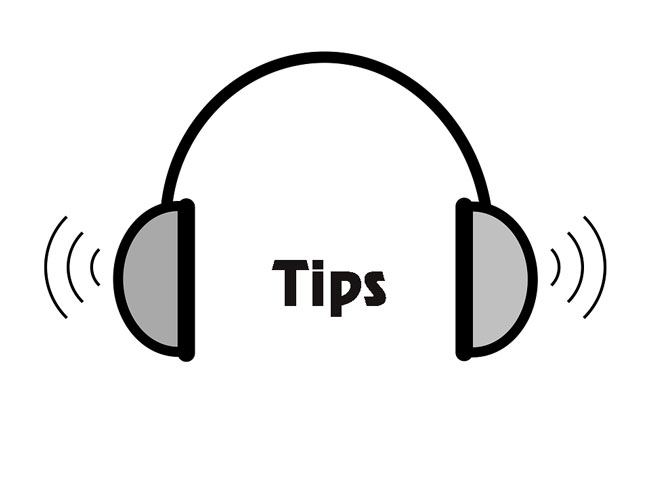
1. Read the Instructions Carefully
This is the golden rule. Before analyzing the questions, check the word count limit.
- Example: If the limit is “TWO WORDS” and the answer is “a leather jacket,” writing “a leather jacket” (3 words) will be marked wrong. You must write “leather jacket.”
2. Analyze Questions and Identify Keywords
Quickly scan the questions to pinpoint Keywords.
- Unchangeable Keywords: Proper nouns like names (John, London), dates (1998), or numbers. These serve as “anchors” for your listening.
- Changeable Keywords: Verbs and adjectives (e.g., “expensive,” “build”). Be mentally prepared for paraphrases (e.g., “costly,” “construct”).
3. Predict the Answers (Grammatical Prediction)
Prediction is not guessing; it is logical deduction. Use the preparation time to determine the Word Class needed.
- Scenario: “The cost of the ticket is $……” -> You know you are listening for a Number.
- Scenario: “The museum is located near the ……” -> You are listening for a Noun (Place).
- Scenario: “The project helps to ……” -> You are listening for a Verb (Base form).
4. Efficient Note-taking
During the recording, do not try to write full sentences. Use abbreviations to keep up with the speaker’s pace.
- Symbols: Use
&or+for “and”,->for “result/so”,w/for “with”. - Shorthand: Write “env” for environment, “dev” for development.
- Tip from IELTS-Testpro: Write the answer exactly as heard. Do not attempt to paraphrase the answer itself; only the question is paraphrased.
5. Cross-check the Answers
After the audio finishes, transfer your answers (if paper-based) or review them (if computer-based).
- Grammar Check: Does the answer fit the prompt grammatically?
- Spelling: Check for silent letters or double consonants (e.g., accommodation, environment).
IV. Common Mistakes & How to Avoid Them
Even advanced learners lose points due to these avoidable errors.
- Exceeding Word Count:
- Error: Writing “The local library” when the limit is two words.
- Fix: Drop articles (a/an/the) or prepositions if necessary. Write “local library”.
- Ignoring Distractors:
- Error: Writing the first answer heard.
- Reason: Speakers often self-correct using linking words like “However,” “But,” or “Apart from.”
- Example: “The price was £10, but now it is £12.” If the question asks for the current price, £10 is a distractor.
- Unit Duplication:
- Error: Writing “$50 dollars”.
- Fix: If the question already has the symbol ($), just write the number. If not, write “$50”.
V. Pro Tips for IELTS Listening Short Answer Questions
- Sequential Flow: Answers always appear in the same order as the recording. If you miss one, move on immediately to avoid the “domino effect” of missing subsequent answers.
- Multi-part Questions: If a question asks you to “List two factors,” the answers usually come close together. Be ready to write quickly.
- Use the “Pause” Wisely: Use the time at the end of the section to check spelling, plural endings (s/es), and tenses (ed/ing).
VI. Practice Exercise
Put your skills to the test with this mini-exercise designed by IELTS-Testpro.
Context: You are listening to a tour guide describing a historical site. Instructions: Write NO MORE THAN TWO WORDS AND/OR A NUMBER for each answer.
- The castle was originally built in the year ____________.
- Tourists are advised to wear ____________ shoes for the walk.
- The main attraction inside the castle is the ____________ room.
Answer Key & Explanations
1. 1450
- Audio Script: “Although many believe it dates back to 1500, the foundation was actually laid in 1450.”
- Explanation: 1500 is a distractor. The phrase “actually laid” signals the correct answer.
2. comfortable / sturdy
- Audio Script: “The path is quite rocky, so please ensure you have comfortable shoes on.”
- Explanation: The adjective is essential here. Note: “comfortable” implies the type of shoes.
3. banquet / dining
- Audio Script: “Don’t miss the banquet room, which is the highlight of the interior.”
- Explanation: “Highlight” is a paraphrase for “main attraction.”
Congratulations! You have mastered the theory of IELTS Listening Short Answer Questions. To access thousands of up-to-date practice tests and refine your skills further, visit IELTS-Testpro today. Let’s achieve that target band score together!